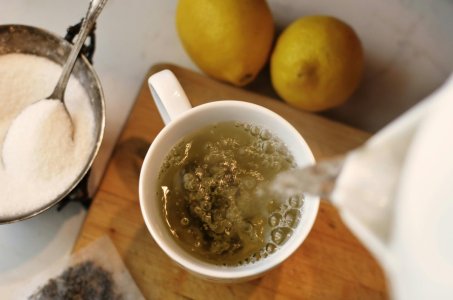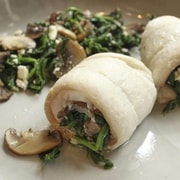A nutritionist reveals the traditional flu remedies that actually work
By
Aubrey Razon
- Replies 0
Flu season is here and it’s time to prepare. But do traditional remedies really work, or is modern medicine the only answer?
Discover the age-old flu cures that experts say might actually hold up!
A steaming mug of lemon and ginger tea sweetened with honey isn't just comforting—it's a concoction backed by nutritional science.
Rakhi Lad, a nutritional therapist at Healthology Hub, affirms that honey is more than just a sweet treat.
Its ability to coat the throat provides a soothing effect, easing irritation and suppressing coughs, often more effectively than some over-the-counter remedies.
Honey's antimicrobial and anti-inflammatory properties, particularly in its raw or Mānuka forms, make it a flu-season staple.
Lemon, with its high vitamin C content, supports the immune system. Although it won't prevent the flu, regular intake can help reduce the duration and severity of symptoms.
Ginger, a spice revered for its medicinal properties, offers anti-inflammatory and antiviral benefits that can help combat viruses and alleviate discomfort, including nausea that sometimes accompanies the flu.
Dietitian Nichola Ludlam-Raine echoes the sentiment that traditional remedies like chicken soup or hot honey, lemon, and ginger tea can soothe flu symptoms.
The benefits may be partly due to the placebo effect, as these remedies provide a “warm internal hug.”
Elderberry and elderflower have also made their mark in traditional medicine.
Lad points out that elderberry extracts can reduce the duration and severity of flu symptoms if taken early.
Both elderberry and elderflower are rich in antioxidants and flavonoids, which bolster immune health and help reduce inflammation.
The practice of tying onions to the soles of the feet or attempting to “sweat out” the illness lacks scientific support and is not recommended.
While onions do contain beneficial compounds like quercetin, they are best consumed as part of a nutritious diet. As for sweating it out, this could lead to dehydration and exacerbate symptoms.
Historical remedies like mustard plasters and fat-based chest rubs may offer temporary comfort through their warming sensation, but they don't address the root cause of the flu.
Instead, Lad suggests using eucalyptus oil in steam inhalation to ease nasal congestion and benefit from its antimicrobial properties.
Alcohol, often touted as a germ-killer, does not help eliminate viruses in the body and may impair the immune system's effectiveness. It's best to avoid alcohol when fighting the flu.
A soothing chicken soup, incorporating fresh garlic into meals, and sipping on chamomile tea can all contribute to healing.
Esther Baylis, a nutritional therapist at Wellswood Health, suggests turmeric tea with black pepper, lemon juice, ginger, and honey to harness anti-inflammatory benefits and enhance absorption.
The cornerstone of flu recovery, however, remains consistent hydration and ample rest.
The body requires energy to heal, and sleep is a critical component of recovery.
Remember, while these remedies can provide comfort and support, it's crucial to consult with a healthcare provider if flu symptoms persist or worsen.
Together, let's embrace the best of both worlds—honoring the remedies passed down through generations while welcoming the advancements that keep us thriving.
 Have you found relief in a time-honored concoction, or do you swear by a particular soup recipe during flu season? Share your experiences with traditional flu remedies in the comments below.
Have you found relief in a time-honored concoction, or do you swear by a particular soup recipe during flu season? Share your experiences with traditional flu remedies in the comments below.
Discover the age-old flu cures that experts say might actually hold up!
The healing power of honey, lemon, and ginger
When the flu strikes, the kitchen often becomes our first line of defense.A steaming mug of lemon and ginger tea sweetened with honey isn't just comforting—it's a concoction backed by nutritional science.
Rakhi Lad, a nutritional therapist at Healthology Hub, affirms that honey is more than just a sweet treat.
Its ability to coat the throat provides a soothing effect, easing irritation and suppressing coughs, often more effectively than some over-the-counter remedies.
Honey's antimicrobial and anti-inflammatory properties, particularly in its raw or Mānuka forms, make it a flu-season staple.
Lemon, with its high vitamin C content, supports the immune system. Although it won't prevent the flu, regular intake can help reduce the duration and severity of symptoms.
Ginger, a spice revered for its medicinal properties, offers anti-inflammatory and antiviral benefits that can help combat viruses and alleviate discomfort, including nausea that sometimes accompanies the flu.
The comfort of chicken soup and herbal teas
The image of a warm bowl of chicken soup as a flu remedy is etched into our collective memory.Dietitian Nichola Ludlam-Raine echoes the sentiment that traditional remedies like chicken soup or hot honey, lemon, and ginger tea can soothe flu symptoms.
The benefits may be partly due to the placebo effect, as these remedies provide a “warm internal hug.”
Elderberry and elderflower have also made their mark in traditional medicine.
Lad points out that elderberry extracts can reduce the duration and severity of flu symptoms if taken early.
Both elderberry and elderflower are rich in antioxidants and flavonoids, which bolster immune health and help reduce inflammation.
Dispelling myths and misconceptions
Not all traditional remedies are created equal, and some have been debunked over time.The practice of tying onions to the soles of the feet or attempting to “sweat out” the illness lacks scientific support and is not recommended.
While onions do contain beneficial compounds like quercetin, they are best consumed as part of a nutritious diet. As for sweating it out, this could lead to dehydration and exacerbate symptoms.
Historical remedies like mustard plasters and fat-based chest rubs may offer temporary comfort through their warming sensation, but they don't address the root cause of the flu.
Instead, Lad suggests using eucalyptus oil in steam inhalation to ease nasal congestion and benefit from its antimicrobial properties.
Alcohol, often touted as a germ-killer, does not help eliminate viruses in the body and may impair the immune system's effectiveness. It's best to avoid alcohol when fighting the flu.
Nutritional therapists' top tips for flu recovery
Beyond traditional remedies, nutritionists recommend practical tips for flu recovery.A soothing chicken soup, incorporating fresh garlic into meals, and sipping on chamomile tea can all contribute to healing.
Esther Baylis, a nutritional therapist at Wellswood Health, suggests turmeric tea with black pepper, lemon juice, ginger, and honey to harness anti-inflammatory benefits and enhance absorption.
The cornerstone of flu recovery, however, remains consistent hydration and ample rest.
The body requires energy to heal, and sleep is a critical component of recovery.
Remember, while these remedies can provide comfort and support, it's crucial to consult with a healthcare provider if flu symptoms persist or worsen.
Together, let's embrace the best of both worlds—honoring the remedies passed down through generations while welcoming the advancements that keep us thriving.
Key Takeaways
- Honey may alleviate sore throats and coughs, outperforming some over-the-counter remedies, and is recommended as a flu-season essential.
- Lemon and ginger added to teas can support the immune system and alleviate flu symptoms due to their vitamin C, anti-inflammatory, and antiviral properties.
- Elderberry extracts can reduce the duration and severity of flu symptoms if taken early, with both elderflowers and elderberries supporting immune health through their rich antioxidant content.
- Traditional remedies like rubbing mustard and lard on the chest or tying onions to the feet are not recommended by experts due to a lack of scientific evidence, whereas staying hydrated and getting rest are critical for recovery from the flu.







